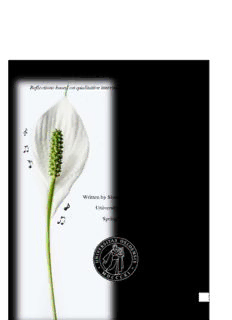Table Of Content“Without music, life would be a mistake.” - Friedrich Nietzsche.
How do music and singing affect singers’ lives?
Reflections based on qualitative interviews with singers and choral conductors
Written by Simone Krallmann
University of Oslo
Spring 2016
1
2
© Simone Krallmann
2016
“Without music, life would be a mistake.” - Friedrich Nietzsche. How do music and singing
affect singers’ lives? Reflections based on qualitative interviews with singers and choral
conductors.
Written by Simone Krallmann
http://www.duo.uio.no/
Printed: Reprosentralen, Universitetet i Oslo
3
4
Abstract
How do we view music and what value do we attribute to musicking activities? Based on the
understanding of music as an activity as opposed to an object, I will seek to answer the
following primary research questions: Can music and singing positively influence people’s lives
and increase their quality of life and sense of well-being? If so, how?
This work includes a combination of my own research data gathered from qualitative interviews
with singers and choral conductors, combined with existing theory and research. The thesis is
comprised of five main sections: Chapter one – Introduction, includes a presentation of
methodology and key terminology. Chapter two explores musicking’s effect upon the
individual, including its role in shaping identity, music as a form of expression, as well as its
relationship with emotion and motivation. Chapter three looks at musicking in an interpersonal
setting, including its impact on our sense of belonging and meaningfulness, as well as exploring
potential benefits of choral singing. Chapter four includes a discussion of findings, and of the
notion of elitism and the availability of musicking for wider society. Chapter five presents
reflections regarding my own research experience, possibilities for future research and closing
thoughts on the power of musicking.
Findings: Musicking and singing can contribute towards quality of life and well-being in many
ways, some of which are mentioned here: Individually, it shapes our identity and sense of self,
allows us to experience mastery and build up our resources, as well as expanding our emotional
experience. In an interpersonal setting musicking contributes to our sense of belonging and
meaningfulness, as well as allowing us to experience Flow. In a choral setting musicking can
also contribute to the transformation of lives.
Theories presented in this thesis include: Fredrickson’s ‘Broaden and Build’ theory, Grandjean,
Sherer and Zentner’s theory of ‘GEMs,’ Juslin and Västfjälls mechanisms for the induction of
emotion through music, and Antonovsky’s theories of Salutogenesis and Sense of Coherence.
Some concepts included in this thesis are: Musicking, Singing, Quality of life, Well-being,
Flourishing, Music and Emotion, Peak Experiences, Identity, Internal and External motivation,
Elitism, Virtuosity, and Transforming power of Music.
i
ii
Foreword
I wish to thank Hallgjerd Aksnes, my tutor at the University of Oslo, for her hard work, input,
helpful feedback and encouragement along the way.
Thank you to my family for their interest, support and inspiration during the writing process,
and a special thank you to my parents for their help with proofreading.
The topic I have chosen to write about, exploring singing and musicking and their
impact on quality of life, well-being and health, is a many-faceted and exciting one.
I hope this thesis will be interesting for people who read it and that it can contribute
valuable insight and thoughts with regard to the debate surrounding the status and value of
music.
Simone Krallmann, Oslo.
iii
iv
Contents
Abstract.................................................................................................................................... i
Foreword................................................................................................................................ iii
Chapter 1. Introduction ............................................................................................................... 1
The aim of this research ................................................................................................. 2
Defining the core topics.................................................................................................. 2
1.1 Contextualising the research............................................................................................. 3
Music and health............................................................................................................. 3
People’s health today ...................................................................................................... 4
1.2 The Structure of the thesis ................................................................................................ 4
A positive field of focus ................................................................................................. 6
Important terminology .................................................................................................... 6
1.3 Presentation of Methodology ........................................................................................... 8
Research method ............................................................................................................ 9
Consent and Anonymity ............................................................................................... 10
Processing and Analysis of the interview material....................................................... 10
Introducing the interview participants .......................................................................... 11
Chapter 2. Musicking’s effect upon the individual .................................................................. 13
2.1. The singer’s identity ...................................................................................................... 14
2.2 Authenticity as a singer or musician .............................................................................. 19
2.3 Singing as expression and communication..................................................................... 21
2.4. Musicking and singing connects us to our emotions ..................................................... 26
What are emotions? ...................................................................................................... 26
An interdisciplinary understanding of music and emotion ........................................... 27
The psychological perspective ..................................................................................... 27
Emotion as represented by musical dynamic ............................................................... 28
Do musical emotions exist? .......................................................................................... 30
v
Perception verses induction of emotion through music ............................................... 31
The cognitivist approach .............................................................................................. 31
The emotivist approach ................................................................................................ 33
A model for the induction of musical emotions ........................................................... 34
What about negative emotions?.................................................................................... 35
Music, emotion and quality of life ............................................................................... 36
2.5 Strong musical experiences ............................................................................................ 38
Peak experiences .......................................................................................................... 38
Intense musical experiences (IMEs) and altered states of consciousness .................... 41
Strong experiences with music (SEMs) ....................................................................... 44
Transcendent and Spiritual experiences with music .................................................... 45
2.6 Motivation for musicking ............................................................................................... 47
2.6.1 External motivation ................................................................................................. 48
External pressure and expectations .............................................................................. 48
A challenging environment .......................................................................................... 49
Approval and feedback from others ............................................................................. 51
How external motivation can become internalised ...................................................... 54
2.6.2 Internal motivating factors ...................................................................................... 55
Nature-given factors ..................................................................................................... 55
Individual needs............................................................................................................ 56
Our thought-patterns ..................................................................................................... 56
A combination of internal and external factors ............................................................ 58
2.7 The importance of mastering singing and life ................................................................ 58
Mastery leads to feelings of control ............................................................................. 60
2.8 Musicking contributes to continuity and coherence in our lives .................................... 61
Chapter 3. Musicking as an interpersonal and interactive process. .......................................... 64
3.1 The role of other people in our musical development .................................................... 66
vi
Description:their lovely Sunday speeches”* (Broschart, 2003, p. 86). point, one can say that music truly has become an essential and integral part of his life and Environmental influence can occur through reward or relationship scenarios in different phases of the child's musical education or maturation.

